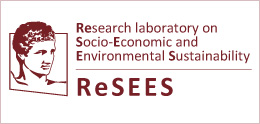Launch of SDSN Europe Report of the Senior Working Group on the European Green Deal
On 29th June, the SDSN Senior Working Group on European Green Deal, led by Prof. Phoebe Koundouri and Prof. Jeffrey Sachs, introduced the 3rd Annual Report titled “Transforming Our World: Interdisciplinary Insights on the Sustainable Development Goals”
This report builds upon the previous findings and insights from our earlier reports, namely “Transformations for the Joint Implementation of Agenda 2030 for Sustainable Development and the European Green Deal: A Green and Digital, Job-Based and Inclusive Recovery from the COVID-19 Pandemic” (2021) and “Financing the Joint Implementation of Agenda 2030 and the European Green Deal” (2022). The latest report delves into the intricate aspects of sustainable development, offering valuable insights to guide policy decisions necessary to tackle these challenges.
To access the complete report, please click here.
Some of the key conclusions that can guide policymakers and stakeholders to take informed decisions and targeted actions, are:
- Policymakers should focus on adopting a region-specific and nuanced approach to drive sustainable development, emphasizing the understanding of interconnected systems and strategic tools such as weaponized interdependence. This includes leveraging interconnected networks for international sustainable policy design and utilizing the EU Green Deal to address externalities like deforestation and work-related accidents.
- ‘Natural capital’, interconnects with social capital and cultural heritage. Aesthetic, historical, social, and spiritual values play a critical role in shaping sustainable development policies.
- Green jobs and digital transition are crucial drivers of sustainable development. Understanding the employment trends and skill requirements in the net-zero economy is critical, and the importance of reskilling policies is underscored.
- The private sector plays a crucial role in financing the SDGs, and identifying SDG content in financial asset portfolios is essential. However, current engagement from the finance industry in funding SDGs remains small compared to the total capital required.
- The SDGs significantly shape the value and effectiveness of financial asset pricing. There’s a strong ESG momentum in international markets, particularly for big stocks showing improved performance.
- Carbon farming and voluntary carbon markets (VCMs) in the EU have significant potential but face challenges that require policy recommendations. Ethical, independent, and transparent governance at all levels is crucial for a just implementation of VCMs.
- Green jobs, particularly in renewable energy sources such as solar PV and wind power, are expected to drive job growth in the power sector. Policymakers need to understand the skills landscape in the green economy to develop targeted retraining and reskilling policies that ensure a just transition for communities affected by the shift to low-carbon industries.
- The use of National Observatories for the Digital Transition is highlighted as a powerful tool for policymakers to analyze the complexities of digitization and foster inclusive and sustainable digital transformations.
Overview of the key speakers and their topics:
- Prof. Phoebe Koundouri – Welcome and Introduction
- Prof. Jeff Sachs – Opening Remarks
- Mr Etienne Berthet (DTU) – Interdependence, Networks, and Green Deal: The EU’s Opportunity to Redefine the Landscape of Global Sustainable Development Challenges
- Mr Christian Hansmeyer (Force for Good) – Private Sector Funding of the SDGs
- Dr. Conrad Landis (AE4RIA) – ESG Momentum in International equity returns and the SDG content of financial asset portfolios
- Prof. George Halkos (AE4RIA)- The Interconnectedness of Natural Capital, Social Capital, Produced Capital, and Cultural Heritage in Sustainable Development
- Prof. Simone Borghesi (University of Siena) – Carbon farming and voluntary carbon markets in the EU: An updated guide
- Ms. Caleigh Andrews (IEA) – The World Energy Employment report: Tracking energy employment to ensure good quality jobs in the net zero (joint work with ENEL Foundation)
- Mr. Edward Cruickshank (FEEM) – Enhancing the Digital and Green Transitions: National Observatories and Targeted Reskilling for Policy Action
- Prof. Leonardo Becchetti (University of Rome Tor Vergata) – Climate responsibility, eco- anxiety, and perception about governments




 Πατησίων 76
Πατησίων 76 30 2108203 455
30 2108203 455
